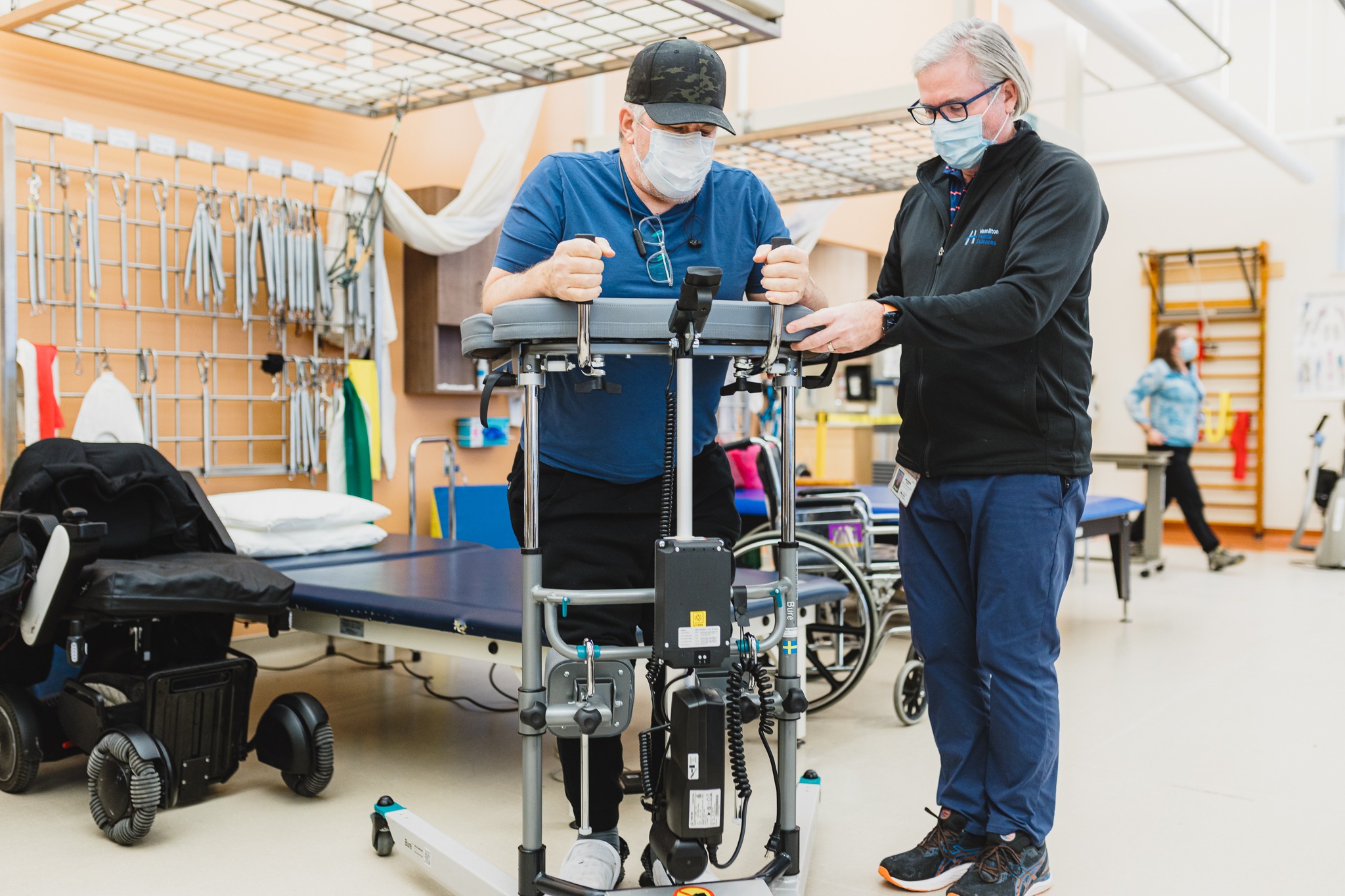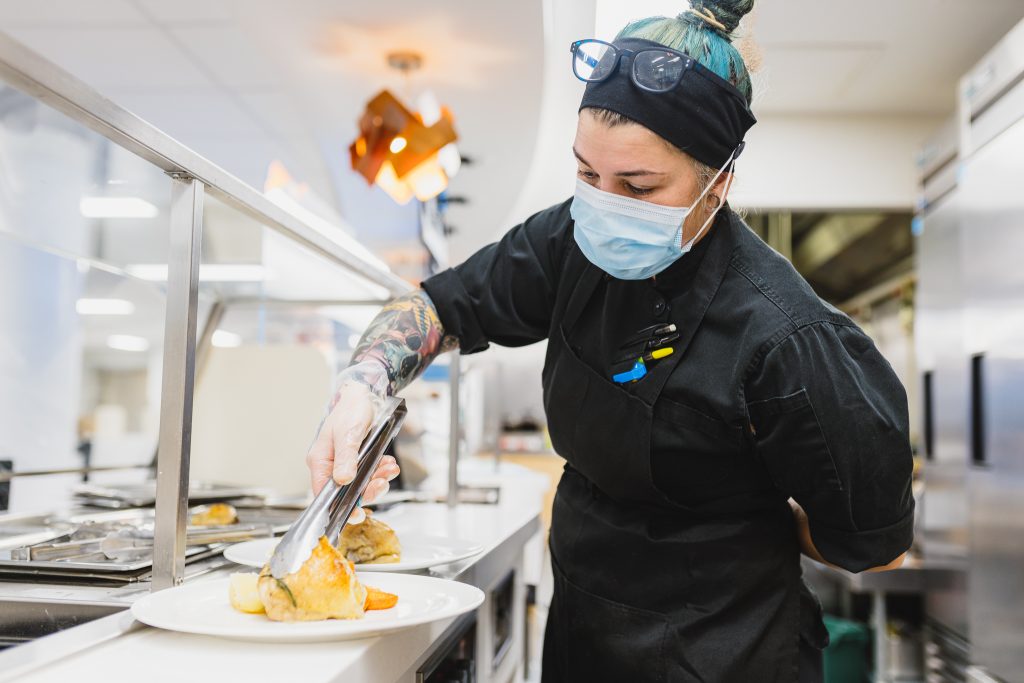
HHSVA bursaries help staff pursue higher education and improve patient care
Make a Purchase, Make a Difference
The Hamilton Health Sciences Volunteer Association (HHSVA) is a non-profit organization that supports patient care at Hamilton Health Sciences (HHS) through the operation of cafes, cafeterias, gift shops and hospital parking. All profits generated are donated to enhance patient care across our family of hospitals. This includes providing educational opportunities for staff, so they can deliver the very best patient care.
Helen Toews wants Hamilton Health Sciences (HHS) to provide the very best real-world experiences to student dietitians doing their placements here.
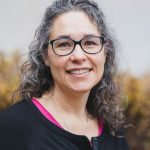
Helen Toews, HHS
dietetic education coordinator
So the dietetic education coordinator, who works at Hamilton General Hospital, applied for a Health Profession Bursary Award from the HHS Volunteer Association (HHSVA) to pursue a PhD in health professions education research at University of Toronto. The HHSVA gives out two bursaries each year to support staff who want to pursue additional education.

Bonnie Buchko, CQI coach
Also receiving a bursary was Bonnie Buchko, a continuous quality improvement (CQI) coach at HHS McMaster University Medical Centre. Buchko used the bursary to complete her master’s degree in quality improvement and patient safety at University of Toronto.
The HHSVA gives back to the hospital in many ways. “Some people don’t realize that HHS cafes, Give (gift) shops and parking fees raise funds that support educational opportunities for staff including these bursaries,” says Tina Cooper, HHSVA’s executive director.

Tina Cooper
“When our staff, physicians, patients and visitors buy food or drinks at one of our cafes or cafeterias, for example, the proceeds from their purchase support a wide range of hospital services, programs and equipment purchases as well as educational opportunities.”
Supporting HHS staff through education
This year, the HHSVA donated $96,000 in support of staff education. As well as the two bursary awards, the HHS Staff Education and Development Fund provides financial support to attend conferences and workshops, and take courses to enhance knowledge and skills. The Health Professional Tuition Assistance Program helps staff improve their knowledge and qualifications.
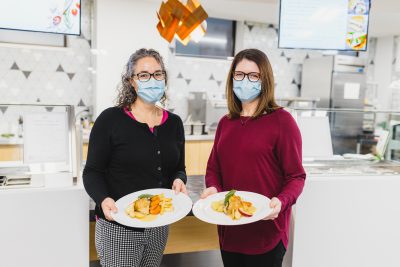
What do these roasted chicken dinners have in common with educational opportunities for HHS staff? Helen Toews and Bonnie Buchko received bursaries from cafe proceeds to broaden their skill sets in their health-care roles.
HHSVA funds also support the hospital’s clinical libraries, which in turn help staff by providing access to a rich selection of educational materials such as journals, textbooks and online resources.
Other areas supported by HHSVA include the purchase of patient equipment such as surgical devices, wheelchairs and walkers; program support for patients such as recreation therapy; emergency social work support for patients; and other staff recognition initiatives such as gift vouchers as a way to say thank you.
Training future dietitians
“As dietitians we use food as a way to help patients improve their health,” says Toews, who has been an HHS dietitian for close to 20 years. Toews worked directly with patients in many areas of HHS before taking on an administrative role running the student placement program.
The students come from Western University’s Brescia University College, where they’re working on either a post-university diploma or their master’s degree. Their 40-week HHS placement provides real-world experience.
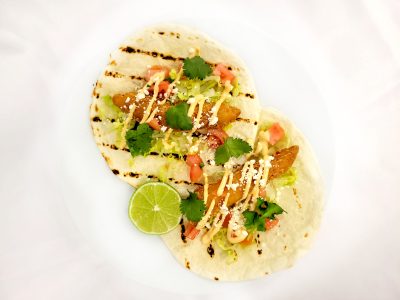
Crispy cod taco
Toews, who is working full-time while studying, expects it will take at least four years to complete her PhD. But she’s already enjoying opportunities to apply what she’s learning through her day-to-day work, which includes developing curriculum, assessing students and supporting their supervisors.
“The PhD work is helping me ensure that these students have the very best learning experience,” says Toews. “And then they can help patients receive the very best and safest care.”
As well as being grateful to the HHSVA for the bursary, Toews says she is thankful to HHS as an organization. “Receiving this support shows that the hospital believes in me and in what I’m doing.”
Improving patient care through continuous quality improvement
Buchko’s educational opportunity is helping her better support staff and doctors in their CQI efforts, which also leads to improved patient care.
“I now have more tools in my tool kit.” — Bonnie Buchko, CQI coach
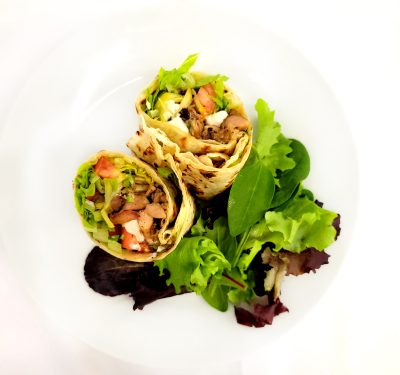
Shwarma sandwich
CQI is a quality management system that encourages all health-care team members to think about, and recommend ways, to improve their work. It’s grassroots and involves patients and the health-care team working together to improve processes that ensure safe, high-quality health care.
“I enjoy learning, and believe that when you understand the theory and best practices behind the work, there’s more opportunity for improvement,” says Buchko. “Patient safety is a really important piece of CQI, and this educational opportunity helped me explore how we can further integrate patient safety improvements into our CQI system.”
Buchko recently finished the one-year master’s degree while working full-time. “I’m very grateful for the bursary from the HHSVA. I now have more tools in my tool kit.”

